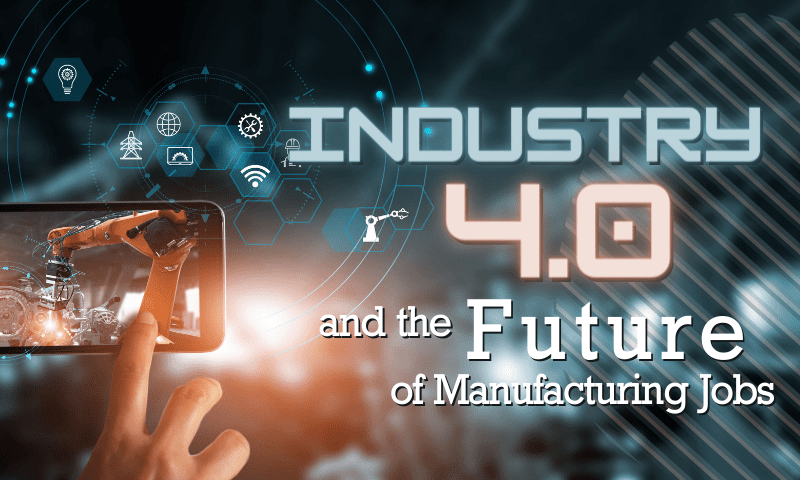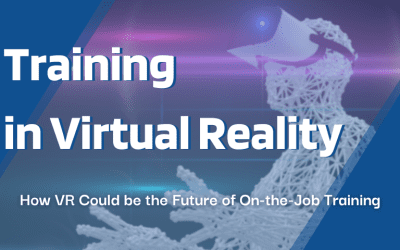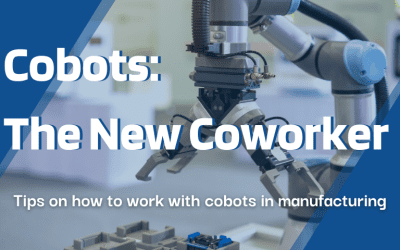What is Industry 4.0?
In a previous blog, we described Industry 4.0 as:
Industry 4.0 refers to a major transformation in the way we live, work, and communicate that is happening right now. Thanks to advanced computing power, computers are now connected and communicate with one another to share important information and even make decisions without human interference. Technologies like the cloud, AI, mobile, IoT, and more have emerged, forever shifting the way we manufacture products and ushering in what many refer to as the fourth industrial revolution.
What does this mean for manufacturing jobs?
Industry 4.0 has been on the rise for several years but was impacted heavily by COVID-19. The pandemic caused many jobs to adapt to a “new normal” and the same is said for manufacturing and Industry 4.0. With social distancing protocols in place for the safety of employees, companies have had to expedite some of these technological advancements. But contrary to what it looks like on the surface, Industry 4.0 doesn’t mean technology and robots are taking over manufacturing plants and employees will soon be out of a job. However, it does mean that the current and future workforce needs to develop a new skillset, “Skills 4.0,” to adapt to the new “smart factories.” Simply put, those childhood dreams we all had way back when of working hand in hand with robots are coming true! In many future smart factory scenarios, it will be the new normal for employees and robots to work together to improve efficiency in the factory.
Industry 4.0 will see new jobs created around technology development and operation. Skills related to STEM (Science, Technology, Engineering, and Mathematics) will no longer only be associated with big technology companies in large cities. Manufacturing facilities will begin introducing these technologies, making it imperative that their employees have the necessary skills to interact with the tech, analyze data, and utilize creative problem-solving skills in a dynamic environment. To put this in perspective, we took two common positions we hire and put an “Industry 4.0” spin on them.
- Machine Operators: These jobs currently involve a lot of pushing buttons and pulling levers; however, industry 4.0 machine operators will see added elements of touch-screen interaction and training through digital interfaces.
- Packers or Warehouse Workers: Currently, these jobs see employees packing and labelling orders before loading or moving the item. Industry 4.0 could create a human-robot collaboration where the machine will load or move the heavy item once the employee is finished with it.
While this shift will cause many current jobs to change, it will also create numerous new job opportunities. According to IOT Analytics, the five jobs below show the most promise of increase in the coming years:
1. Industrial Data Scientists*:
The role of a data scientist is to extract and prepare data, conduct advanced analytics, and apply the findings to improve products or production. Industrial data scientists must understand both manufacturing processes and IT systems and possess strong root cause analysis skills to identify correlations and draw conclusions.
2. Robot Coordinator*:
The role of robot coordinator will be a newly created industrial IoT job with the responsibility to oversee the robots on the shop floor and respond to malfunctions or error signals. The coordinator will carry out both routine and emergency maintenance tasks and involve other experts as needed. If a robot must be taken out of service, the coordinator will replace it with a substitute in order to reduce production downtime. This will be an ideal position for current Machine Operators to be retrained for in the future
3. IT/IoT Solution Architect*:
The IT solution architect has end-to-end responsibility for applications such as remote operation centers, predictive maintenance, or assisted operations through augmented reality. As with the industrial data scientist, the IT solution architect possesses a broad range of skills, relating business know-how and IT experience with data management, application, and technology skills.
4. Industrial Computer Engineer*:
The IT solution that is designed by the IT solution architect gets brought to life by the industrial computer engineer. Three kind of programming skills are necessary for these kinds of industrial IoT jobs. The programmer should be experienced in some of the major general purpose languages such as Java, C++, or Python. They should be able to work with specific applications for industrial simulations or for general data analytics programming. Finally, there is an important hardware component in the industrial programming environment.
5. Industrial UI/UX Designer*:
From intuitive manufacturing dashboards on tablets and mobile phones, to machine interfaces and robot interaction, augmented reality applications in operations and maintenance and finally the service and product design for the users of industrial equipment – the industrial environment will see a dramatic increase of user interfaces that need to be optimized for usability.
Whether Industry 4.0 causes your current job to evolve or inspires you to strive for a new career in one of the fields above, it will be imperative to begin developing your new “Skills 4.0” skillset.
One skill that will never go out of style is communication so why not start there? Check out “4 Future Forward Communication Skills Worth Building” to get started!
{{cta(‘cef47a6c-23f1-4d53-9156-073d4d165ae7’)}}
*Definitions are directly taken from IOT Analytics.




-400x250.png)